This morning, the 9th of May, 2014, has started as it had throughout my life, since I remember myself: we are getting out the war decorations of my grandfathers, Vasiliy and Alexey, and displaying them upon the most honourable place in the drawing room.
Here it is, on the palm of my son who is sixteen now, Granddad Vasiliy’s Order of the Red Star… on his other palm, there are two Orders of the Red Star – those are Granddad Alexey’s – enamel on one of the Orders, on its left side is chipped off – it’s a mark of a well-aimed enemy bullet… this Red Star saved Granddad Alexey’s life…
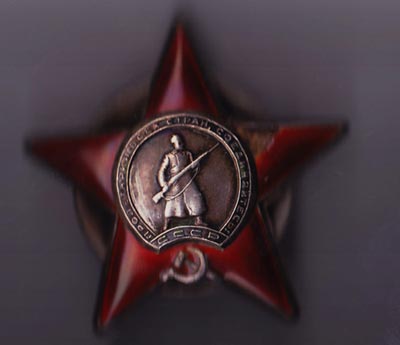
My Granddad Vasiliy Ilyich started his way along the War roads in the woods of the Crimea. When the Crimea was occupied by fascist forces, he went to the woods with a guerrilla group. The commander often sent Vasiliy Poludnev to the coast to fetch foodstuffs and to reconnoitre things – my Granddad spoke German well, he was a man of great erudition and had a wonderful eye-memory.
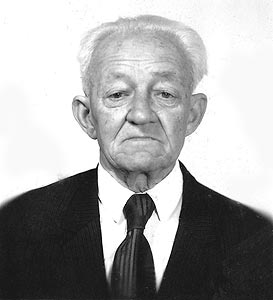
Василий Ильич Полуднев
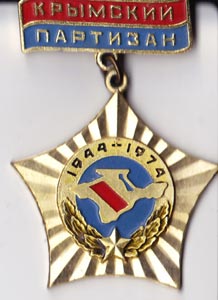
Once he was not back for a long time, they lost hope to see him in the group again…
All of a sudden – there’s he, in the evening twilight; Vasiliy is coming bent under the weight of a heavy load, carrying a huge sack. He came and collapsed on the ground along with his sack: «Undo it, guys, I’ve hardly managed to get it here…»
They untied the sack, and there was a German officer of a high rank, bound hand and foot, and half dead with fear…
«Vasiliy! Where have you caught him?!» – they asked Granddad.
«Just like that», – says Granddad, – «we got to talking, I started to recite Goethe in German to him … he gave way to his feelings… So, I’ve caught him…»
In such a way, my Granddad Vasiliy Ilyich captured ‘a tongue’, an information prisoner…
From the dense woods at the foothills of Chatyrdag, Granddad Vasiliy Ilyich went as far as Berlin. He participated in the battle for Koenigsberg, was among those who liberated Warsaw…
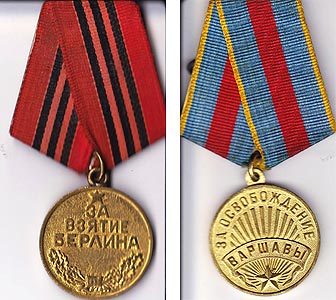
He witnessed the Colours of our Great Victory flying; and although he used to tell us about the war, he dwelled only on that, on the events of that particular day…
Granddad didn’t like telling about the war.
Instead, up to the final days of his life, he could recite poetry for hours on end – poems by Derzhvin, Pushkin, Ibsen, Goethe, Shakespeare…
One year, Granddad Vasiliy celebrated the Victory Day with us in Moscow. I remember him to put on his best jacket from the very morning, with a single medal pinned to the breast – The Medal for Courage…
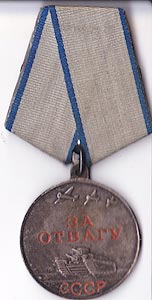
“Grandpa, pin on the others, if nothing else, pin on the Red Star!” – I asked him.
But he shook his head: “That’s enough. You know, the highest honour is that we survived and preserved our country… here, you could be born…”
Granddad Alexey Kusmich died much earlier than Granddad Vasiliy Ilyich, I didn’t know him at all…
But no, it’s not true.
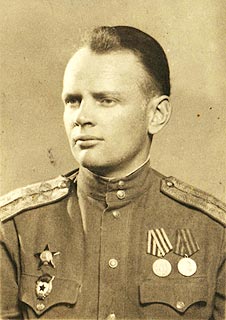
Alexey Kuzmich Siourin
I know Granddad Alexey very well, I see and hear him retreat with the others from the first day of the war – from the most western boundaries, unable to restrain the violent pressure of the enemy, I see him coming as far back as Moscow, I see him standing up for it together with the others…
I see him going along the front-line roads back – from East to West – further on, with more confidence, taking part in liberation of Prague, entering Vienna…
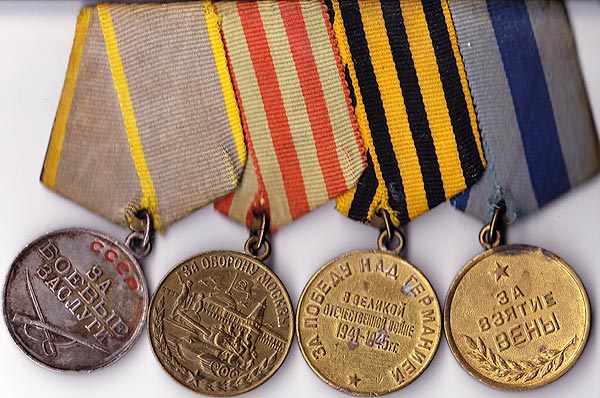
There was a tip-off against Granddad Alexey Kusmich during the war; now it doesn’t matter who personally did it and for what reason. Granddad was degraded and sent to command a penal battalion – Alexey Kusmich was a battalion commander. The battalion had an order to capture a nameless height, it was quite typical: empty naked field, not a single bush around, a hill in the middle, and a little village; on the top of the hill there is a church with a steeple, and German machine gunners in it.
It was all, just like in the song:
“On the hill and over mead, there’s a steeple a-towering,
From the steeple, from the top, machine-gun thrashes hard…”
It was impossible to capture the height but to strew the field with the dead bodies of the soldiers. Perhaps, it was why the penalty battalion was ordered there…
And late in the night before the assault, a very religious old man comes to the battalion commander. He looks around, and sees Alexey Kuzmich doesn’t sleep, smokes cigarettes one after another, his writing-book is scribbled all over with plans of the assault, but all in vain…
The old man says, “You’ll put down all the men, Aliosha. Just listen, here is a story from the First World War, perhaps, it comes in handy…”
In the dim dawn light the Germans on the height saw an incredible, fearful sight: with the first rays of the sun, out of the snow-covered field around the village, ghostly men were rising – in their underwear, without insignia, without uniform, with no weapon, even with no boots, just in foot-binding… they were getting up, and in silent rows marching to the height.
Thos who survived in the village told that it had looked as if fallen soldiers had been appearing right from under the ground, and marching into battle…
The psychological attack was effective, the fascists who had already been defeated near Moscow, who had been acquainted with the sacrificial nature of the Russian soldiers incomprehensible for them, were scared, lingered, and did not open fire at the men-ghosts…
These first minutes of confusion settled the outcome of the fight. When the machine-gunners came to their senses and opened fire, the man-to-man fight was on at the walls of the steeple, and my Granddad Alexey was rushing to the church like all the others, in his underwear and foot-rags…
The height was taken. With minimal losses. Granddad Alexey Kuzmich was returned to his previous battalion, restored in rank and suggested an option: either one more medal or a leave warrant for several days, to meet his family… my Grandpa had chosen the latter.
And my Great-aunt Valentina had a fight with a Gestapo officer. Her husband George was taken to Gestapo on suspicion of being a Jew – he was a Greek, with curly dark hair, aquiline nose; and a hairdresser at that…
Gandma Valentina was not home at the time, and when she learned about that, she rushed to Gestapo office on Polikourovskiy Kholm, for they had occupied one of the best castle-like mansions built by Russian gentry at the beginning of the century. She could never explain how she managed to force her way into the office, but she did and she shouted loudly at the German officer trying to explain something or to convince. The officer made attempts to throw her out, Grandma Valya seized him by the hair and could have torn it out with its roots, unless another German arrived in time to slash her across her face with a lash…
She regained consciousness in the street, covered with blood, under the walls of Gestapo office. She crawled to the nearest alley, and people helped her to get home. For the rest of her life, Grandma wore the mark of meeting Gestapo men – a fearful scar across her face running from her left temple and over her cheek-bone, lips and chin…
Strange as it is, after several days Granddad George was released. Tortures in Gestapo took their toll – for the rest of his life Granddad George was paralysed. He lived a long life. And for the years, Grandma Valya nursed and spoon-fed him…
Meanwhile my direct Grandma Lyuba was travelling from the Crimea to her evacuation point in Central Asia.
Two women, Lyuba and Nadya, and six children: Klava, Lera, Vitalik, Lena, Zhora and baby Sveta. They were travelling on the carriage roofs – the people fleeing from the war were short of seats in the trains. Women tied the children to the ventilation tubes, so they would not fall down. The train was stopped at a dead-end siding in the desert, because there had been an act of sabotage. So the women and the children were sitting amidst the sands and waiting, for they could do nothing else. That night my Grandma Lyuba was on the verge of getting mad: she felt wrecker-werewolves on long and slender legs all around her (she could not understand why), some herons, people on stilts and other scum…
Nevertheless, my Grandma Lyubov’ Simionovna did not get mad that night. She was a very strong woman.
She was as many others were then – steadfast, of strong mind, heart and will. Had they been different, you and me would not have existed now…
One can and should always write and tell about the Great Patriotic War, for ever.
These are always with us – the dreadful war and the Great Victory.
They are always here, next to us: our granddads, grandmas, our parents.
They keep looking into our eyes, our fallen warriors.
They are crying out to us today; as loud as they have never done before:
Remember!
Do not forger – forgetfulness would turn harm for you.
Do not sell yourself to those, on whose walls we had written our names.
Do not go begging from those, whose cities we had been liberating.
Do not believe those who had been trying to destroy us for several centuries.
They will fail.
And we, we’ll manage for sure!
HAPPY DAY!
HAPPY VICTORY DAY!
